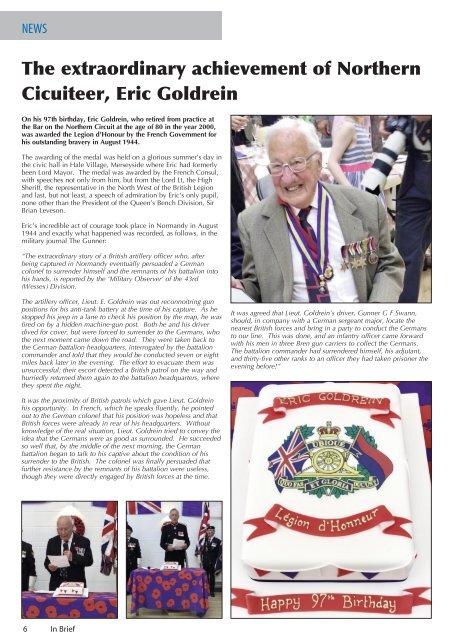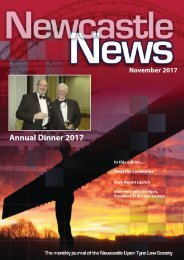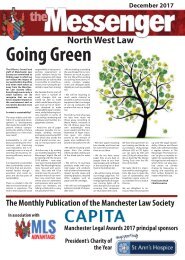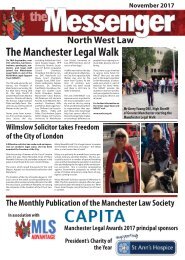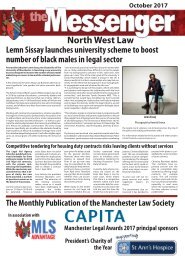In Brief Aug 2018
You also want an ePaper? Increase the reach of your titles
YUMPU automatically turns print PDFs into web optimized ePapers that Google loves.
NEWS<br />
The extraordinary achievement of Northern<br />
Cicuiteer, Eric Goldrein<br />
On his 97th birthday, Eric Goldrein, who retired from practice at<br />
the Bar on the Northern Circuit at the age of 80 in the year 2000,<br />
was awarded the Legion d’Honour by the French Government for<br />
his outstanding bravery in <strong>Aug</strong>ust 1944.<br />
The awarding of the medal was held on a glorious summer’s day in<br />
the civic hall in Hale Village, Merseyside where Eric had formerly<br />
been Lord Mayor. The medal was awarded by the French Consul,<br />
with speeches not only from him, but from the Lord Lt, the High<br />
Sheriff, the representative in the North West of the British Legion<br />
and last, but not least, a speech of admiration by Eric’s only pupil,<br />
none other than the President of the Queen’s Bench Division, Sir<br />
Brian Leveson.<br />
Eric’s incredible act of courage took place in Normandy in <strong>Aug</strong>ust<br />
1944 and exactly what happened was recorded, as follows, in the<br />
military journal The Gunner:<br />
“The extraordinary story of a British artillery officer who, after<br />
being captured in Normandy eventually persuaded a German<br />
colonel to surrender himself and the remnants of his battalion into<br />
his hands, is reported by the ‘Military Observer’ of the 43rd<br />
(Wessex) Division.<br />
The artillery officer, Lieut. E. Goldrein was out reconnoitring gun<br />
positions for his anti-tank battery at the time of his capture. As he<br />
stopped his jeep in a lane to check his position by the map, he was<br />
fired on by a hidden machine-gun post. Both he and his driver<br />
dived for cover, but were forced to surrender to the Germans, who<br />
the next moment came down the road. They were taken back to<br />
the German battalion headquarters, interrogated by the battalion<br />
commander and told that they would be conducted seven or eight<br />
miles back later in the evening. The effort to evacuate them was<br />
unsuccessful; their escort detected a British patrol on the way and<br />
hurriedly returned them again to the battalion headquarters, where<br />
they spent the night.<br />
It was agreed that Lieut. Goldrein’s driver, Gunner G F Swann,<br />
should, in company with a German sergeant major, locate the<br />
nearest British forces and bring in a party to conduct the Germans<br />
to our line. This was done, and an infantry officer came forward<br />
with his men in three Bren gun carriers to collect the Germans.<br />
The battalion commander had surrendered himself, his adjutant,<br />
and thirty-five other ranks to an officer they had taken prisoner the<br />
evening before!”<br />
It was the proximity of British patrols which gave Lieut. Goldrein<br />
his opportunity. <strong>In</strong> French, which he speaks fluently, he pointed<br />
out to the German colonel that his position was hopeless and that<br />
British forces were already in rear of his headquarters. Without<br />
knowledge of the real situation, Lieut. Goldrein tried to convey the<br />
idea that the Germans were as good as surrounded. He succeeded<br />
so well that, by the middle of the next morning, the German<br />
battalion began to talk to his captive about the condition of his<br />
surrender to the British. The colonel was finally persuaded that<br />
further resistance by the remnants of his battalion were useless,<br />
though they were directly engaged by British forces at the time.<br />
6 <strong>In</strong> <strong>Brief</strong>


